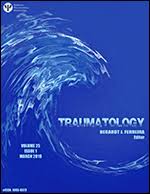New research published on therapists’ functioning and STS post-COVID-19
Led by Assistant Director of Research, Dr. Sarah A. Crabtree, the Danielsen Institute’s research team had another key study from the Peale grant project recently published in the journal Traumatology. Focused on therapists’ functioning and secondary traumatic stress emerging from the pandemic, findings point to both protective strengths (e.g., self compassion, differentiation of self) and risk factors, as well as important suggested next steps at individual and organizational levels. Below is the citation and abstract.

Crabtree, S. A., Captari, L. E., Guterres, K. M., Choe, E. J. Y., & Sandage, S. J. (2025). Therapists’ functioning and secondary traumatic stress emerging from the COVID-19 pandemic: A mixed methods study. Traumatology. Advance online publication. https://dx.doi.org/10.1037/trm0000576
Mental health clinicians (MHCs) are at known risk for adverse outcomes such as compromised well-being, mental health challenges, burnout, and secondary traumatic stress. Prior research has identified demographic and work-related risk factors, but fewer studies have examined personal capacities that might reduce risk and simultaneously promote MHC well-being. Research is also needed on the interplay between these factors and wider contextual influences. This mixed methods study explored MHC functioning and factors contributing to their experiences coming out of the COVID-19 pandemic. We used a concurrent triangulation design and collected cross-sectional survey data between 2022 and 2023 from a U.S. sample of MHCs (N = 116). Latent profile analysis identified four distinct profiles on indicators for self-compassion, differentiation of self, burnout, well-being, and work-related secondary traumatic stress. Concurrently, we used reflexive thematic analysis to analyze MHCs’ responses to open-ended questions about their experiences, including (a) work-related situations that contributed to overwhelm, fear, and/or helplessness, (b) what they found challenging about their work, (c) what fueled or sustained them to continue in their work, even under stressful conditions, and (d) and what they needed to thrive. Finally, we integrated latent profile analysis and qualitative findings. Our findings signal the potential benefits of holistic MHC development for mitigating risk and supporting well-being, as well as highlighting how systemic ingenuity will be necessary to address the organizational and contextual factors compounding risks when working with distressed and traumatized populations. Implications and directions for future research are discussed.
